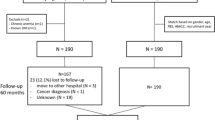Abstract
Objective: To test the short and long-term effectiveness of a four week residential program for primary health care patients to control obesity and related risk factors for cardio-vascular disease (CVD), especially blood pressure (BP).
Design: Prospective clinical study, with follow up after 1 and 5 y.
Setting: Vindeln Patient Education Centre, Vindeln, and Department of Social Medicine, University of Umeå , Sweden.
Subjects: Approximately 2500 individuals, with two or more of the traditional risk factors for CVD, participated in the program. This report describes a subsample of 100 consecutive patients, 52±9 y, 53 men, with obesity and/or high BP.
Intervention: Four week residential program with lectures and group discussions as well as practical sessions in smaller groups (meal preparations, physical exercise, etc). The patients were followed-up medically in their home area.
Outcome measures: Weight and blood pressure.
Results: Dramatic reductions of weight and, especially, of blood pressure (BP) occurred during the residential weeks, and the reductions were pronounced also after 1 y. After 5 y, the total mean weight among men with initial BMI ≥30 kg/m2 was still 5 kg lower, and diastolic and systolic BP among those with hypertension was 15 and 20 mm Hg lower, respectively, than before the program.
Conclusions: The full-time participation in the residential program and the enrollment and commitment of the patients may explain the clinical outcome. A level of predisposition greater than that required of most weight- and BP-control programs was confirmed and a great preventive or therapeutic potential was indicated. The study illustrates an effective application of the Precede-Proceed model of health promotion planning.
Sponsorships: The County Council of Västerbotten, and The Swedish Council for Planning and Coordination of Research (FRN), (grant no 880704:2 A14-5/11) Sweden.
This is a preview of subscription content, access via your institution
Access options
Subscribe to this journal
Receive 12 print issues and online access
$259.00 per year
only $21.58 per issue
Buy this article
- Purchase on Springer Link
- Instant access to full article PDF
Prices may be subject to local taxes which are calculated during checkout
Similar content being viewed by others
Author information
Authors and Affiliations
Contributions
Guarantor: M Sjöström
Rights and permissions
About this article
Cite this article
Sjöström, M., Karlsson, A., Kaati, G. et al. A four week residential program for primary health care patients to control obesity and related heart risk factors: effective application of principles of learning and lifestyle change. Eur J Clin Nutr 53 (Suppl 2), s72–s77 (1999). https://doi.org/10.1038/sj.ejcn.1600807
Published:
Issue Date:
DOI: https://doi.org/10.1038/sj.ejcn.1600807
Keywords
This article is cited by
-
Normobaric hypoxia training causes more weight loss than normoxia training after a 4-week residential camp for obese young adults
Sleep and Breathing (2014)
-
Effectiveness of PRECEDE model for health education on changes and level of control of HbA1c, blood pressure, lipids, and body mass index in patients with type 2 diabetes mellitus
BMC Public Health (2011)
-
Bariatric Surgery versus Lifestyle Interventions for Morbid Obesity—Changes in Body Weight, Risk Factors and Comorbidities at 1 Year
Obesity Surgery (2011)
-
Weight Loss Maintenance in Severely Obese Adults after an Intensive Lifestyle Intervention: 2‐ to 4‐Year Follow‐Up
Obesity (2007)
-
Prediction of all-cause mortality in a patient population with hypertension and type 2 DM by using traditional risk factors and serum-phosphate,-calcium and-magnesium
Acta Diabetologica (2007)


